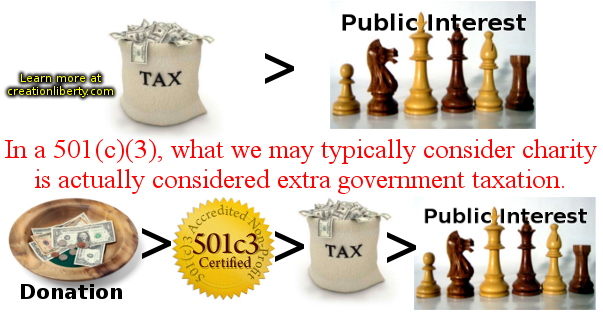However applying for tax-exempt status can be advantageous in some cases. Special Rules Limiting IRS Authority to Audit a Church.
 501c3 The Devil S Church Johnson Christopher J E 9798615062025 Amazon Com Books
501c3 The Devil S Church Johnson Christopher J E 9798615062025 Amazon Com Books
Facts about 501c3 tax-exempt status for the church Most churches in America have organized as 501c3 tax-exempt religious organizations This is a fairly recent trend that has only been going on for about fifty years.

Churches and 501c3 status. There are no biblical commands that require a church becomes a legal nonprofit under this structure. Only churches wanting to accept grant money must be designated a 501c3. The 501 c 3 speech restrictions apply only to corporations that are organized as a 501 c 3.
Is no longer free to speak to the vital issues of the day. Although there is no requirement to do so many churches seek recognition of tax-exempt status from the IRS because this recognition assures church leaders. A church may engage in legislative activity as long as it is not a substantial part of the churchs activity.
The two issues are independent. There is no law that prohibits churches from speaking on candidates politics or legislation. The First Amendment guarantees the right of free exercise of religion and of free speech.
Because churches make no exchange for a 501c3 letter or to incorporate they retain their constitutional rights no matter what corporate form. Waives its right to influence legislators and the legislation they craft. The Restriction of Political Campaign Intervention by Section 501c3 Tax-Exempt Organizations.
However some Christians and churches wonder whether it is biblical to seek 501c3 incorporation. Churches that believe it is their responsibility to raise and foster Godly leaders in our representative democracy may do so but not as a 501 c 3. Churches were only added to section 501c3 of the tax code in 1954.
However 501 c 3 status is a matter of federal tax law not state law. Waives its freedom of speech. Waives its constitutionally guaranteed rights.
A brief description of annual filing requirements for tax-exempt churches and religious organizations. Political Campaign Activity by section 501c3 tax-exempt organizations. The not-for-profit corporation is a common corporate structure for churches to use.
Churches Endorsing Move to Amend. 501c3 nonprofit status or anything similar to it did not exist during the New Testament period. Independent local churches that are not part of a national denomination often file for tax-exempt status to provide evidence of their status.
The truth is churches do not give up their constitutional rights by incorporating or applying for a 501c3 letter from the IRS. However on the issue of 501c3 churches the pastors deacons and elders SIGNED A CONTRACT stating they would give up their rights then the IRS DOES have right to tell a 501c3 church what it can and cannot preach and if pastors and deacons refuse to do what they stated they would do in contract then the IRS is MORE Biblically sound to enforce the regulations the 501c3 churches. For example an unincorporated organization can be a 501 c 3 organization under federal tax law.
When a church accepts the 501c3 status that church. Churches and 501 c 3 Status Churches are not required to apply for tax-exempt status under Section 501 c 3 of the IRS Code. An example of this occurred when the Congressional Black Caucus held a conference to give advice to black churches on how to deal with the rise in voter ID laws to aid in voting for Barack Obama the United States first black president.
There is a false assumption by many churchgoers today that in order to be an official church one must obtain 501c3 status but this could not be further from the truth. Tax exempt status is of vital importance to church leaders because without it most of their members will no longer give money in support of the church. Additionally not all activity a church.
Waives its freedom of religion. There is no law anywhere that requires any church to get 501c3 status and as we will see later it is most often done for financial benefit. 501c3 Tax-Exempt Status Impacts and Limitations Any 501c3 church can endorse Move to Amend without threatening tax-exempt status.
These restrictions on free speech are in direct conflict with the First Amendment yet most churches have chosen to apply for a determination as a 501 c 3. Churches that meet the requirements of IRC Section 501c3 are automatically considered tax exempt and are not required to apply for and obtain recognition of tax-exempt status from the IRS.
